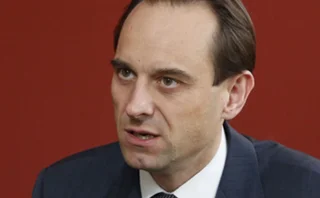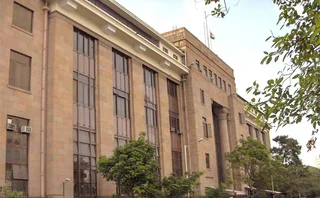
G-20 ministers agree expansion of international financial organisations
World finance chiefs agree on the future form of international oversight
HORSHAM, UK - Finance ministers and central bankers from the G-20 nations met in the UK on Saturday for a preliminary meeting ahead of the heads of state summit on April 2. The focus was on establishing preconditions for the expansion of existing international financial institutions, perhaps into a single, global institution.
The meeting, held south of London at Horsham in West Sussex, discussed the role of the World Bank, the Financial Stability Forum, the International Monetary Forum (IMF) and the World Trade Organisation (WTO) in developing future effective global macroeconomic supervision. UK prime minister Gordon Brown had already stoked expectations before the G-20 summit by calling for "Bretton Woods 2" - in reference to the 1944 financial summit that founded the IMF, WTO and World Bank.
"The G-20 supports our proposal for a substantial increase to emergency IMF resources through a major enlargement of the New Arrangements to Borrow and expansion of its membership," said US Treasury secretary Tim Geithner. "We have asked the World Bank and other multilateral development banks to leverage existing resources by flexible use of their balance sheets to help meet financing needs.
"Alongside this framework, we have expanded membership of the Financial Stability Forum, and we should elevate its role in the international system so that the global economy has - alongside the original Bretton Woods institutions of the IMF, the World Bank and the WTO - a strong institution able to lead these critical efforts to a more robust framework of oversight and standards for the global financial system," said Geithner.
The US Treasury secretary said national regulatory change must be matched by the international reforms. He said the US would soon embark on its own comprehensive framework of regulatory reform but because "risk does not respect national borders" the G-20 agreed it was necessary to make concrete changes at international level.
Geithner broke down the areas of reform into four priority areas: "First, all institutions that are important to the stability of the financial system should come within a much stronger framework of oversight, with clearer rules of the game that are enforced more evenly and consistently across countries. Second, all markets, including the derivatives markets, need to be subject to standards for stability and a framework for disclosure. Third, looking forward we need to provide much stronger cushions of stability to ensure that the framework of capital requirements and accounting standards dampens rather than amplifies future financial crises. Fourth, we must promote financial market integrity. We welcome Switzerland's announcement to increase information sharing as part of the global effort to end tax evasion."
Only users who have a paid subscription or are part of a corporate subscription are able to print or copy content.
To access these options, along with all other subscription benefits, please contact info@risk.net or view our subscription options here: http://subscriptions.risk.net/subscribe
You are currently unable to print this content. Please contact info@risk.net to find out more.
You are currently unable to copy this content. Please contact info@risk.net to find out more.
Copyright Infopro Digital Limited. All rights reserved.
You may share this content using our article tools. Printing this content is for the sole use of the Authorised User (named subscriber), as outlined in our terms and conditions - https://www.infopro-insight.com/terms-conditions/insight-subscriptions/
If you would like to purchase additional rights please email info@risk.net
Copyright Infopro Digital Limited. All rights reserved.
You may share this content using our article tools. Copying this content is for the sole use of the Authorised User (named subscriber), as outlined in our terms and conditions - https://www.infopro-insight.com/terms-conditions/insight-subscriptions/
If you would like to purchase additional rights please email info@risk.net
More on Financial stability
A regulatory storm hits China
Regulators are imposing a new wave of tighter financial supervision
Haldane dismisses talk of monetary and macro-prudential tensions
Bank of England’s Andrew Haldane says it is a virtue that different tools can be used to meet conflicting objectives
Central banks laying the seeds for crisis, says UK MP Baker
Chair of UK parliamentary group for economics says a sharp correction in developed world sovereign bond prices could spark a collapse in confidence
Q&A: Mark Branson on the too-big-to-fail problem, modelling and Basel III
Switzerland went first – and furthest – on post-crisis banking reforms, making its industry a test case for the impact of the new regime. But it has not yet solved the too-big-to-fail problem, Mark Branson, chief bank supervisor at Eidgenössische…
Risk Annual Summit: Depositors will trust EU guarantee despite Cyprus, says BdF official
Policy-makers have incentive to accelerate deposit guarantee plans, says Sylvie Matherat of the Banque de France
Risk Annual Summit: Banking union set for mid-2014, says ECB
National supervisors made “gigantic mistakes”, says ECB's financial stability head
RBI sees developing repo markets necessary in meeting Basel liquidity rules
India central bank views repo as an increasingly important market in the wake of Basel III implementation
ESRB narrows its macro-prudential tools
The European Systemic Risk Board is about to announce a slimmed-down list of potential macro-prudential tools, but who has the power to use them is still the subject of debate. By Michael Watt
Most read
- Top 10 operational risks for 2024
- Japanese megabanks shun internal models as FRTB bites
- Market for ‘orphan’ hedges leaves some borrowers stranded







